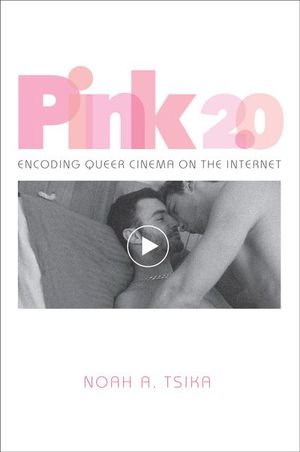Pink 2.0
Published by Indiana University Press
An analysis of the relationship between the internet and queer cinema.
In an era of digitally mediated cropping, remixing, extracting, and pirating, a second life for traditional media appears via the internet and emerging platforms. Pink 2.0 examines the mechanisms through which the internet and associated technologies both produce and limit the intelligibility of contemporary queer cinema. Challenging conventional conceptions of the internet as an exceptionally queer medium, Noah A. Tsika explores the constraints that publishers, advertisers, and content farms place on queer cinema as a category of production, distribution, and reception. He shows how the commercial internet is increasingly characterized by the algorithmic reduction of diverse queer films to the dimensions of a highly valued white, middle-class gay masculinity?a phenomenon that he terms “Pink 2.0.” Excavating a rich set of online materials through the practice of media archaeology, he demonstrates how the internet’s early and intense associations with gay male consumers (and vice versa) have not only survived the medium’s dramatic global expansion but have also shaped a series of strategies for producing and consuming queer cinema. Identifying alternatives to such corporate and technological constraints, Tsika uncovers the vibrant lives of queer cinema in the complex, contentious, and libidinous pockets of the internet where resistant forms of queer fandom thrive.
“A rich, thought-provoking study at the cutting edge of media evolution. We certainly need more work like this: writing that expands the field of film and media studies into digitally without throwing the field-as-it-was completely overboard.” —B. Ruby Rich, author of New Queer Cinema: The Director’s Cut
“Offers a most important contribution to scholarship in both queer studies and new media studies, and among its most significant accomplishments is its ability to imagine and explicate the crucial connections between these two disciplines in ways that I have not seen previously attempted . . . Pink 2.0 is impeccably researched.” —Michael DeAngelis, author of Gay Fandom and Crossover Stardom
In an era of digitally mediated cropping, remixing, extracting, and pirating, a second life for traditional media appears via the internet and emerging platforms. Pink 2.0 examines the mechanisms through which the internet and associated technologies both produce and limit the intelligibility of contemporary queer cinema. Challenging conventional conceptions of the internet as an exceptionally queer medium, Noah A. Tsika explores the constraints that publishers, advertisers, and content farms place on queer cinema as a category of production, distribution, and reception. He shows how the commercial internet is increasingly characterized by the algorithmic reduction of diverse queer films to the dimensions of a highly valued white, middle-class gay masculinity?a phenomenon that he terms “Pink 2.0.” Excavating a rich set of online materials through the practice of media archaeology, he demonstrates how the internet’s early and intense associations with gay male consumers (and vice versa) have not only survived the medium’s dramatic global expansion but have also shaped a series of strategies for producing and consuming queer cinema. Identifying alternatives to such corporate and technological constraints, Tsika uncovers the vibrant lives of queer cinema in the complex, contentious, and libidinous pockets of the internet where resistant forms of queer fandom thrive.
“A rich, thought-provoking study at the cutting edge of media evolution. We certainly need more work like this: writing that expands the field of film and media studies into digitally without throwing the field-as-it-was completely overboard.” —B. Ruby Rich, author of New Queer Cinema: The Director’s Cut
“Offers a most important contribution to scholarship in both queer studies and new media studies, and among its most significant accomplishments is its ability to imagine and explicate the crucial connections between these two disciplines in ways that I have not seen previously attempted . . . Pink 2.0 is impeccably researched.” —Michael DeAngelis, author of Gay Fandom and Crossover Stardom
BUY NOW FROM
COMMUNITY REVIEWS

